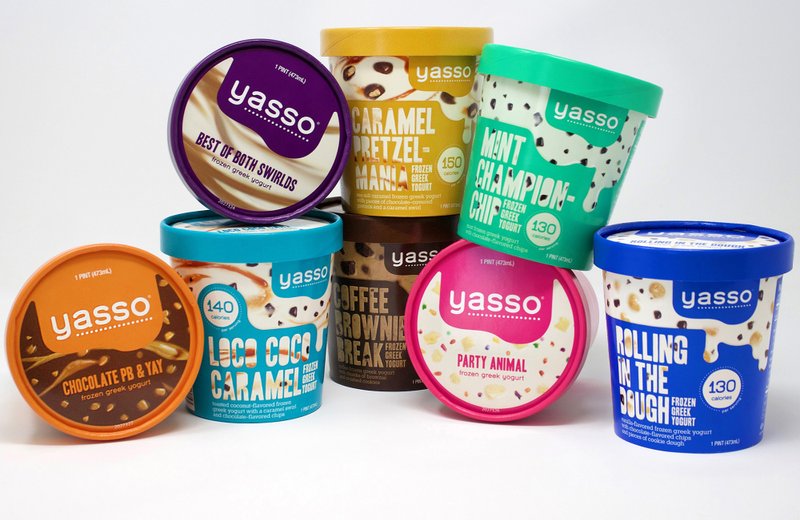The battle in the freezer case is heating up: A small but growing pair of upstarts is grabbing market share as Nestle and Unilever, reigning emperors of ice cream, watch their brands slump.
Now the newbies themselves are going head to head.
Yasso, the maker of frozen Greek yogurt bars, is launching a line of pints in a direct challenge to Halo Top, the low-calorie ice cream whose sales ballooned to nearly $300 million last year. Yasso hopes to attract fickle customers who want to eat more healthfully but are also drawn to indulgence.
Yasso, which surpassed $75 million in retail sales last year, catapulted into view a few years ago when its bars were spotted in a picture posted on Facebook by football star Tom Brady, famous for his finicky, health-conscious eating. The company thinks fans of low-calorie ice cream -- Halo Top pints average about 300 calories -- will gravitate toward a product with fewer calories than a comparable helping of Ben & Jerry's but offering a touch more decadence than healthier Halo Top.
"People get fatigued when they realize it doesn't taste good," said Drew Harrington, who runs the Quincy, Mass.-based company with co-founder Amanda Klane. "We think they'll be more interested in consuming Yasso over some of those diet brands."
The new Yasso pints have 400 to 600 calories and feature ingredients like brownie chunks, caramel swirls and cookie dough. The company isn't explicitly pushing a pint as a serving size, but it credits Los Angeles-based Halo Top with convincing people that it's not the start of a shame spiral to inhale a whole pint in a single sitting.
"I used to think a full pint was only for my sad nights," Klane said.
Halo Top combines low calories with a savvy social-media presence and flashy packaging. Sales soared more than 1,600 percent last year. Yasso sales rose 22 percent last year, according to data from IRI, a Chicago-based market-research company. Its bars will be available in more than 15,000 stores nationwide this year.
Many longtime staples made by the giant food companies -- brands that were dominant for decades -- are falling out of favor. Over the past three years, the 10 largest U.S. packaged-food companies have seen about $17 billion in sales evaporate. That comes as consumers move to niche brands and trendy new products. The ice cream war shows why Big Food is struggling: Even when the behemoths try to make healthier versions of their products to compete with the new kids, the new kids usually get the credit.
Last year, standbys like Nestle's Drumsticks and Unilever's Klondike bars saw sales fall. Skinny Cow, a dessert brand owned by Nestle, saw sales dip 17 percent in the year that ended Nov. 5, according to IRI.
Of course, America's leading ice cream companies aren't on the verge of surrender. Last year, Unilever's ice cream sales were $3.6 billion and Nestle's were $2.2 billion, according to Euromonitor.
Nestle brands include Dreyer's and Edy's. Unilever makes Breyer's and Ben & Jerry's.
Yasso hit shelves in 2011. At the time, the Greek yogurt craze was in full swing, thanks to Chobani. Yasso started with fruit flavors that were about 70 calories a bar, and Harrington said they were constantly asked about chocolate and other indulgences such as mint chocolate chip and cookie dough. Yasso eventually embraced them, and now they're putting them into pint containers.
"Frozen is probably one of the more difficult places to launch a new product, but if you can show growth," supermarkets will make precious space available, said John Stanton, a professor of food marketing at Saint Joseph's University in Philadelphia. "A lot of these older brands aren't growing at all."
SundayMonday Business on 01/07/2018
